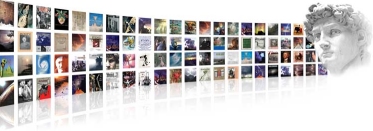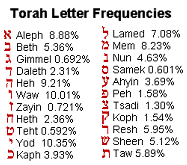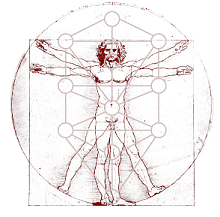|
Introduction
A KEY DIFFERENCE BETWEEN Kabbalistic philosophy and Christian theology concerns their respective views of human nature. For the Kabbalist, human nature is essentially "asleep" or in a state of "forgetfulness" regarding its divine origin. People are really made in the "image of God," which (for the Kabbalist) means that each of us are essentially divine beings... Each soul is a miniature version of God Himself, like a fragmented holographic image ("monads"). Human beings are not "totally depraved" or victims of "original sin," but are rather covered up with kelipot ("shells") that need to be removed so that the "original spark" of God can shine through. According to Kabbalah, every soul is "pure in essence," and the only "salvation" to speak of is to become enlightened (i.e., to remember the truth of who and what we really are). The "Fall of Man" is a metaphor of our preexistent soul's concealed desire to "decend in order to (re)ascend." Our present condition is one of ignorance, and therefore there is no need for a flesh-and-blood Savior (much less for a vicarious atonement made by the Savior on a cross). "Salvation" is the process of "clearing out" whatever obstructs our manifestation of the concealed divine image so that the inner light of God can freely shine through us. Performing mitzvot (commandments) as ritual acts are intended to reawaken the latent power of the soul (i.e., following the "yellow brick road" of tikkun olam and "raising of the sparks"). At its heart, then, Kabbalah is a self-refinement process, a mystical approach to the meritocracy that is foundational to normative Judaism. Ironically, (i.e., despite its pantheism), Kabbalah leads to the conclusion that ultimately we must rely on ourselves -- for we alone have the power to save ourselves. People don't need a real, flesh-and-blood "Jesus," they need gnosis, enlightenment, and release from the ego.
If you are acquainted with the ancient Greek philosopher Plato (428-348 BC), some of this should sound familiar. Plato earlier taught that the soul "preexisted" in the ideal realm of Forms before it "fell" to the earth and "forgot" its divine origin. Knowledge is therefore an act of "recollection" of the divine/ideal world (anamnesis), and education is the means of leading the soul to a higher realm of consciousness. In his famous Allegory of the Cave, Plato suggested that people were imprisoned within a darkened space, deceived by their finite egos and blinded by their own limited perspectives. These "prisoners" do not see reality, but only shadowy representations of it. (In today's terms, these people would confuse "reality" with the fiction they see and hear on television [especially the "news" or official government propaganda], in the movies, in popular culture (including public education), in art and fashion, etc.)

The enlightened soul, however, escapes the from the murky cave and, through an intellectual journey (i.e., the dialectic of reason), discovers a higher realm of true reality -- culminating in a mystical awareness that the Good (ŽäßĮĖ ß╝Ć╬│╬▒╬ĖŽī╬Į) is the sole origin of everything that exists. But since everything that exists "participates" in the Form of the Good, ultimately all that truly exists is "the One" (ŽäßĮĖ ß╝Ģ╬Į) in Plato's metaphysical system.

In the Midrash (Genesis Rabbah, c. 6th century AD), it's stated that God "looked into the Torah and created the world," suggesting that the Divine Mind shaped the universe (ŽĆ╬╗╬«ŽüŽē╬╝╬▒) according to a set of eternal Forms or Ideas. The very letters of the Torah were considered expressions of these Divine Forms, "black fire on white fire" ("the flame alphabet"), which God used as a sort of divine "protoplasm" for creation.

Plato's metaphysical system later became the foundation for both Gnosticism and "Neo-Platonic emanation cosmology," both of which became incorporated into Kabbalah as "Judaeo-Platonic" emanations (see Gershom Scholem's Origins of the Kabbalah for more information). The Kabbalists also adopted the neo-Platonic doctrine of the One (i.e., Plato's reworked "Form of the Good") and renamed it as "Ein Sof" (the Infinite One), describing it (as Plotinus earlier did) as "beyond all categories of being and non-being." From this One the universe first expressed itself as Nous (i.e., Divine Thought or Logos, renamed as Chokhmah), the first "will" or expression of the One in the lower world. From Nous proceeded the World Soul, which later became identified with Binah as the "Demiurge" of creation, and so on. "Salvation" is human happiness (i.e., ╬ĄßĮÉ╬┤╬▒╬╣╬╝╬┐╬Į╬»╬▒) obtained by unifying the soul with that which is ideal.
Now let me add a twist to this discussion by suggesting that not all of this thinking is bad, though all of it must be heavily qualified and informed by the teaching of the New Testament. While it is certainly true that all human beings are made b'tzelem Elohim -- in the image of God (Gen. 1:26) -- that image, essentially composed of spirit (Gen. 2:7, John 4:24), was radically marred and distorted by the Fall of Adam and Eve, and their physical descendants are therefore said to be inheritors of a fallen nature (Rom. 5:12). This is because the essence of spirit is relationship itself, and should the relationship be broken, so is the underlying image... A "second touch" from God is therefore needed, a second "breath" from the Divine -- beyond the initial touch and breath that gave rise to physical life -- and that comes from the Spirit (lit. "breath") of God.

Adam and Eve sinned by eating from the "tree of the knowledge of good and evil," but the Messiah is the Tree of Life (ūóųĄūź ūöųĘūŚųĘūÖų╝ų┤ūÖūØ), whose death upon the "tree" sets us free from the cursed state of our natural forebears (Gal. 3:13). The good news is that the divine image can be restored or "recreated" through the grace of God found in the Messiah and His sacrifice (Eph. 4:24, 2 Cor. 5:17, 2 Pet. 1:4). After the resurrection "[Yeshua] breathed on them and said, 'Receive the Holy Spirit'" (John 20:22). Ultimately paradise lost will be paradise restored in the world to come (Rev. 22).
The unregenerated soul is blocked or impaired from seeing the truth because the "god of this world" has a "blinding" influence over the soul. "If our gospel is veiled, it is veiled only to those who are perishing. In their case the god of this world has blinded the minds of the unbelievers, to keep them from seeing the light of the gospel of the glory of the Messiah, who is the image of God (ßĮģŽé ß╝ÉŽāŽä╬╣╬Į ╬Ąß╝░╬║ßĮ╝╬Į Žä╬┐ß┐” ╬Ė╬Ą╬┐ß┐”)" (2 Cor. 4:3-4). As Yeshua said, "The one who has seen Me has seen the Father" (John 14:9), and "those who do not honor me do not honor the Father who sent me" (John 5:23).
Trust in the risen Messiah and the gift of divine sight provides an inner radiance that comes from God Himself. "For God, who said, "Let light shine out of darkness," has shone in our hearts to give the light of the knowledge of the glory of God in the face of Yeshua the Messiah" (2 Cor. 4:6). There is a veil over the eyes of the unbeliever, "but when one turns to the Lord, the veil is removed." The Spirit of God gives us true freedom to reflect His grace and love in our lives so that "we all, with unveiled face, beholding the glory of the Lord, are being transformed (╬╝╬ĄŽä╬▒╬╝╬┐ŽüŽåßĮ╣Žē, 'metamorphosed') into the same image (╬Ąß╝░╬║ßĮĮ╬Į) from one degree of glory to another. For this comes from the Lord who is the Spirit" (2 Cor. 3:17-18). Follows of Yeshua are to be "lights of the world" who "let their light shine" through deeds that emulate the Master (Matt. 5:14-16). But note that the light comes from the image of the Messiah -- not from a hidden spark of inner divinity...
Because we experience God "before the throne of Grace" (Heb. 4:16) we can shine the light of His gracious Presence to others... The agency of our change -- and therefore of our ability to genuinely reflect the image of God -- comes from the Holy Spirit, not through human wisdom or knowledge. And since Yeshua is the "image of the invisible God" and the "radiance of the glory of God and the exact imprint (Žć╬▒Žü╬▒╬║ŽäßĮĄŽü, 'character') of his nature" (Col. 1:15, Heb. 1:3), the image of God within us is ultimately transformed into the image of the Messiah Himself. Believers are "predestined to be conformed (ŽāŽģ╬╝╬╝ßĮ╣ŽüŽå╬┐ŽģŽé - lit. 'formed with') the image of his Son" (Rom. 8:29). Those who deny that Yeshua is the Messiah simply cannot apprehend the image of God. Moreover, seeing the image of God in Yeshua does not deify us, but rather transforms (╬╝╬ĄŽä╬▒╬╝╬┐ŽüŽåßĮ╣Žē) us into the same image, ever increasing from one stage of glory to a higher stage of glory. In short, the focus is not on ourselves as miniature images of God, but rather on "the Messiah in you, the hope of glory" (Col. 1:27).

Related Topic
The Structure of the Soul

|






